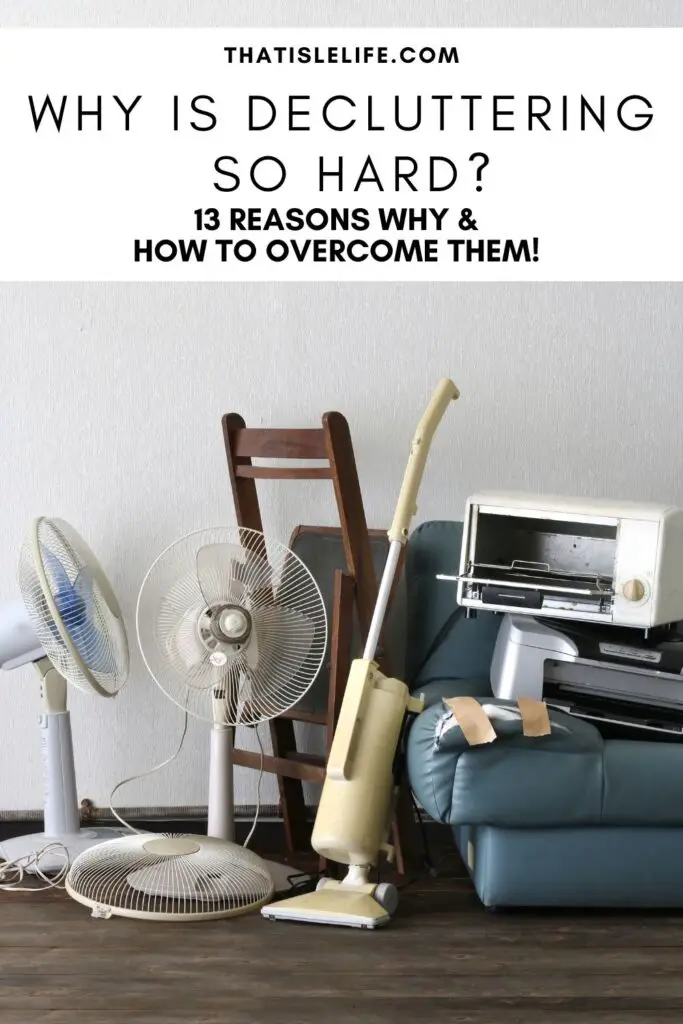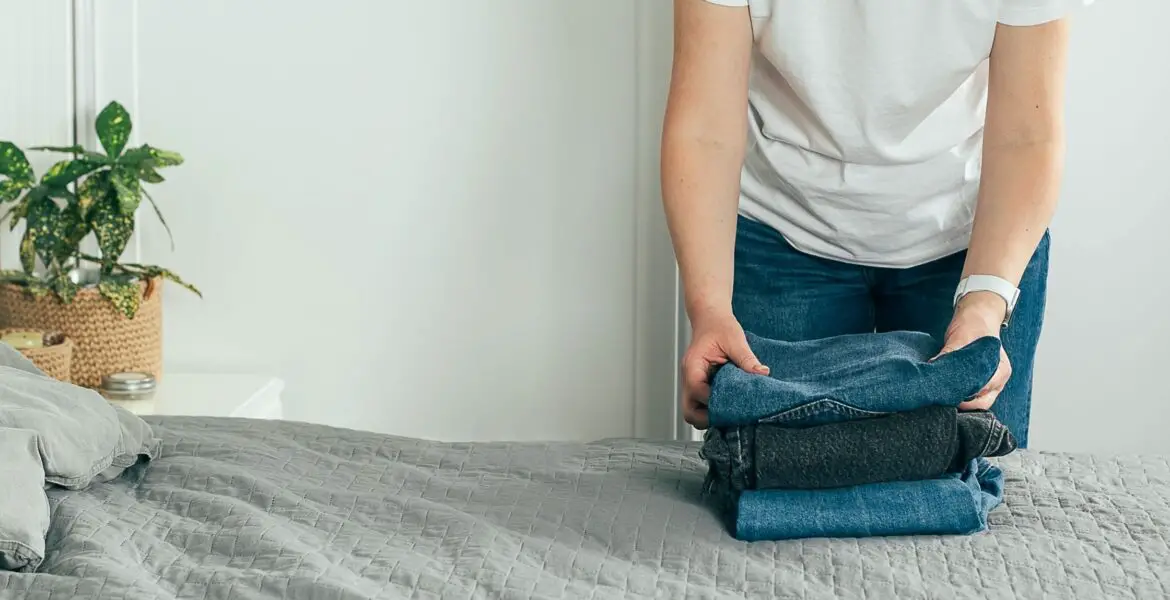Have you ever wondered why decluttering is so hard? Here are 13 reasons why decluttering can be challenging and how you can overcome them.
Are you one of many who find decluttering so hard?
Trust me, I can relate! Decluttering doesn’t come easy to me either.
Many of us feel a sense of dread whenever we think about decluttering our homes but we can’t pinpoint why.
Here are 13 reasons why decluttering is so hard and how you can overcome them.
Learn why you’re struggling with decluttering and how to overcome these barriers, and you’ll be one step closer to decluttering successfully!
Related decluttering posts:
- 15 Decluttering Blogs That Will Motivate You To Start Decluttering Today
- How To Get Rid Of Sentimental Clutter (And Why You Shouldn’t Feel Guilty!)
- 9 Decluttering Motivation Tips That Will Help You To Keep Going
- How To Declutter Quickly – 12 Ways To Declutter In 30 Minutes
- 100 Things To Declutter Today – Get The Ultimate Decluttering Checklist
- How To Declutter Your Garage Without Feeling Overwhelmed
- How To Be Ruthless When Decluttering Clothes Once And For All
- 10 Decluttering Tips For Seniors To Make Their Lives Easier
- How To Declutter Books For Book Lovers
- How To Declutter Paperwork Quickly (& 5 Important Organizing Tips!)

Table of Contents
Why is decluttering so hard? 13 reasons why you’re stuck and how to overcome them
1. You are too overwhelmed by the clutter and don’t know where to start
Have you ever thought of decluttering but stopped yourself because you simply did not know where to start?
You’re probably thinking of ALL of the clutter in your house wondering, “How on earth am I going to declutter everything?”
After a long week of work, the last thing you want to do is declutter the entire house.
After all, decluttering IS hard work and it takes up a lot of time and energy.
How to overcome this: The best way to remove any overwhelm in a task is to simply get started and stop overthinking.
Not sure where to start? Throw the trash out first. Go around each room in the house and pick up any visible trash like empty packaging. This step is easy to accomplish because it requires zero thought.
Once you’ve started, it’s a lot easier to keep going. It also helps to refer to a decluttering checklist so you don’t have to figure it out on your own.
2. You have no time to declutter
Some of you may find decluttering hard because you feel like you have no time.
When you think of decluttering, you assume you’ll need to have at least one full day without distractions to get the job done.
For most of us, that’s simply not possible because we have to juggle work, family, friendships, and other commitments.
How to overcome this: Remember, decluttering is not a sprint but a marathon! Instead of dedicating a whole day to declutter, you can set 10-30 minutes a day to get rid of the things you don’t need.
Better yet, declutter as you go when you’re working on everyday tasks. For instance, you can remove any torn, stained, or worn clothes from your wardrobe when you’re putting away the laundry.
Give yourself grace and don’t rush the process. Speed is not a priority when it comes to decluttering. Consistency is! As long as you remain consistent with your decluttering efforts, you will surely see results.
3. You lack the motivation to declutter
It’s normal to feel demotivated to declutter at times. Let’s face it – there are a million things we’d rather do than declutter!
Often we don’t have the motivation to declutter because we are worried about failure. So, we procrastinate and do other things instead.
How to overcome this: First and foremost, it’s important to set specific and realistic goals before you start decluttering.
Instead of setting one big goal, create a list of micro-goals instead.
For instance, replace “I want to declutter my entire home” with micro-goals like:
- Declutter duplicate kitchen utensils
- Get rid of worn tea towels and dish rags
- Discard broken kitchen tools and appliances
Micro goals are easier to achieve, which means there will be plenty of small wins to celebrate!
Besides that, you can also find motivation by getting inspiration from these amazing decluttering blogs.
Related: 9 Decluttering Motivation Tips That Will Help You To Keep Going
4. You have a negative mindset
Some of you may find decluttering difficult because you have a negative mindset.
You have 101 excuses why decluttering will never work for you. You say things like:
“I’ve always been a disorganized person! I can’t change who I am.”
“What’s the point of decluttering? My home will eventually be messy again!”
“I don’t have to declutter – I thrive in disorganized chaos!”
Well, here’s the thing: the more we say these statements, the more we believe them!
How to overcome this: The first step to overcoming a negative mindset is to change the way you think completely.
Allow yourself to imagine what it would be like if you lived in a clutter-free home. Chances are you’ll start to feel more relaxed and motivated to declutter.
Replace your negative mindset with positive thoughts like:
- I’m excited to declutter because I get to create a calm space for myself
- Decluttering will help me to save time, money, and energy in the long run
- I will feel better about myself and my environment after I declutter
5. You are a perfectionist and want everything to look perfect
Maybe you’ve seen Pinterest-worthy decluttering before and after photos and thought, “I’ll never be able to do that!”
If this sounds like you, you are most likely a perfectionist, and you rather not do something if you know it’s going to be less than perfect.
Seeing people’s picture-perfect homes overwhelms you and puts you off from decluttering.
How to overcome this: Recognise that online photos are almost always staged. They are often photographed in the best lighting and are edited to achieve the flawless look we admire.
When decluttering, progress is far more important than perfection.
Avoid focusing on the aesthetic of the outcome. Instead, pay attention to how decluttering your home makes you feel.
Having a lot of stuff can weigh you down and make you feel restless and anxious. On the contrary, a clutter-free home will make you feel relaxed and happy because you have fewer things to worry about!

6. Your belongings are part of your identity
Many of us think that what we own contributes to who we are.
This is because our materialistic society tells us we need to own more things if we want to be seen as successful.
We are reluctant to let go of our possessions because we are afraid of what people may think of us.
How to overcome this: Don’t worry about people’s opinions about you. You don’t have to define success like everyone else. You can choose to be rich in experiences rather than material things.
If the clutter in your home stresses you out, you are better off trying to get some peace by decluttering.
Remember, YOU are the one living in your home, not others. So, do what makes you feel good and ignore the haters.
7. You seek comfort in things
Decluttering is hard for some people who tend to seek comfort in their belongings.
Maybe it’s the stamp collection you had as a teenager. Or the self-help books that got you through a tough time.
These things used to bring you solace so you naturally want to hold on to them.
How to overcome this: Remind yourself that you are more than your belongings.
These items have served you well, and they can do the same for another person if you don’t need or use them anymore.
8. You don’t know what to do with the things you want to get rid of
Some people avoid decluttering altogether because they just don’t know what to do with the things they want to get rid of.
If you’re one of them, you’re probably worried that all of the things you want to declutter will end up in trash bags somewhere in your garage. Thus, creating more clutter.
How to overcome this: Before you declutter, make a plan of what you’re going to do with the things you want to get rid of.
If you plan to donate or recycle it, have a list of potential donation/recycling centers ready. You can even call ahead and make arrangements to get your stuff picked up from your home.
If you plan to sell it, decide where you’ll sell these items and make sure you have everything set up from the get-go.
Additionally, give yourself a deadline to sell these items. If you can’t sell it by the deadline, you’re better off donating these items.
9. You save things “just in case”
Are you someone who saves things you don’t need or use regularly because you’re afraid you might need them in the future?
A lot of people don’t declutter because they don’t want to regret their decluttering decisions. They rather hold on to the clutter than go through the inconvenience or hassle of acquiring the item again.
How to overcome this: Be honest with yourself. When was the last time you needed or used the item in question?
If you haven’t taken it out in a year, likely, you won’t need/use it ever. You probably won’t even miss the item once it’s gone!
Besides, if you do need it in the future, you can always borrow it from someone you know.

10. You feel guilty for wasting money
Decluttering is hard when there’s guilt involved.
Many of us feel guilty for getting rid of things we spent our hard-earned money on. Especially when they’re still in perfect condition.
As a result, we have trouble decluttering because we don’t like the idea of wasting money.
How to overcome this: Change your mindset. Rather than thinking you’re wasting money, tell yourself that this item may provide more value to someone else who may need it.
You’ll feel a lot better when you realize that you have the power to give the item to a more deserving owner.
11. You are obligated to keep something because it was a gift
Sometimes it is tough to declutter when you feel obligated to keep something.
You feel bad because you don’t want to seem unappreciative. Plus, you don’t want people to be mad or upset at you!
How to overcome this: It’s OK if you don’t like a gift. It doesn’t mean you don’t appreciate the gesture or the person who gave it to you.
When you receive a gift, this means the gift is yours. You can do whatever you want with it!
Re-gift it to someone who will appreciate it more. Just make sure to express your gratitude to the person giving the gift, AND be honest to the person you’re regifting it to.
12. You have a strong emotional attachment to certain items
Decluttering sentimental items is very hard. Most of us have a strong emotional attachment to specific items, which makes it challenging to let go.
We want to save certain things because they remind us of our loved ones and the memories we shared with them.
How to overcome this: Decluttering doesn’t mean you have to get rid of every single thing. I get it – some precious things in your life are irreplaceable.
For this reason, you can create a memory box. Just make sure you limit the size of the said memory box.
This is a great way for you to manage the number of items you get to keep. Ultimately, this will help you to sift through and pick the items that are truly valuable to you.
13. Your family, partner, or roommates don’t want to declutter
Some of you struggle with decluttering because you do not have a supportive and conducive environment.
Maybe your family, partner, or roommates don’t want to declutter.
As a result, you’re not sure if you should go ahead because you don’t want to step on anyone’s toes.
How to overcome this: Don’t let anyone hold you back! You can still declutter your belongings – just don’t touch anything that doesn’t belong to you.
If you share the item with someone in the house, have an honest and respectful discussion with them before you declutter.
This is also the perfect time to lead by example. The people in your household may be motivated to declutter when they witness all the benefits decluttering brings.

Frequently Asked Questions
Why is it taking me so long to declutter?
Decluttering is not a cookie-cutter process. Some people may take longer to declutter, and that’s OK.
Don’t compare your decluttering journey to someone else’s. Decluttering is more productive when you focus on consistency rather than speed.
However, if you’re looking to make some progress in a short amount of time, here are 12 simple ways you can declutter in 30 minutes.
What questions should I ask myself when decluttering?
If you don’t know if you should declutter something, here are ten questions to help you make a decision:
- Do you use it?
- If yes, when was the last time you used it? Is this something you use regularly?
- Is it in good condition?
- Do you have a duplicate of the item?
- Do you have something else that you like better that serves the same purpose?
- Would you buy it again?
- Could you borrow this item from a friend?
- Would it be too expensive to replace?
- Would you take this with you if you had to move to a smaller space?
- How would you feel if you didn’t own this item anymore?
Conclusion
Sometimes the easiest way to change your mindset about decluttering is to acknowledge WHY you find decluttering difficult.
Once you’ve identified the reasons that hold you back, you can actively work on overcoming them.
Decluttering IS hard for everyone, but I promise your hard work will pay off!
Did this post help you to discover why you’re struggling with decluttering? Share why decluttering is hard for you in the comments below!
Found this post helpful? Check out these other decluttering blog posts:
- 15 Decluttering Blogs That Will Motivate You To Start Decluttering Today
- How To Get Rid Of Sentimental Clutter (And Why You Shouldn’t Feel Guilty!)
- 9 Decluttering Motivation Tips That Will Help You To Keep Going
- How To Declutter Quickly – 12 Ways To Declutter In 30 Minutes
- 100 Things To Declutter Today – Get The Ultimate Decluttering Checklist
- How To Declutter Your Garage Without Feeling Overwhelmed
- How To Be Ruthless When Decluttering Clothes Once And For All
- 10 Decluttering Tips For Seniors To Make Their Lives Easier
- How To Declutter Books For Book Lovers
- How To Declutter Paperwork Quickly (& 5 Important Organizing Tips!)

